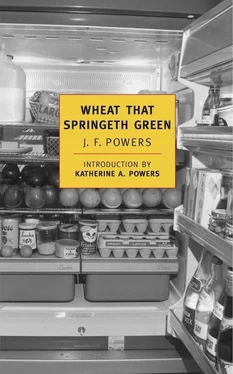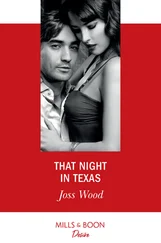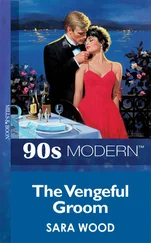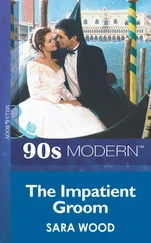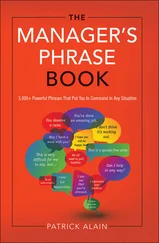J. Powers - Wheat That Springeth Green
Здесь есть возможность читать онлайн «J. Powers - Wheat That Springeth Green» весь текст электронной книги совершенно бесплатно (целиком полную версию без сокращений). В некоторых случаях можно слушать аудио, скачать через торрент в формате fb2 и присутствует краткое содержание. Год выпуска: 2000, Издательство: NYRB Classics, Жанр: Современная проза, на английском языке. Описание произведения, (предисловие) а так же отзывы посетителей доступны на портале библиотеки ЛибКат.
- Название:Wheat That Springeth Green
- Автор:
- Издательство:NYRB Classics
- Жанр:
- Год:2000
- ISBN:нет данных
- Рейтинг книги:5 / 5. Голосов: 1
-
Избранное:Добавить в избранное
- Отзывы:
-
Ваша оценка:
- 100
- 1
- 2
- 3
- 4
- 5
Wheat That Springeth Green: краткое содержание, описание и аннотация
Предлагаем к чтению аннотацию, описание, краткое содержание или предисловие (зависит от того, что написал сам автор книги «Wheat That Springeth Green»). Если вы не нашли необходимую информацию о книге — напишите в комментариях, мы постараемся отыскать её.
Wheat That Springeth Green — читать онлайн бесплатно полную книгу (весь текст) целиком
Ниже представлен текст книги, разбитый по страницам. Система сохранения места последней прочитанной страницы, позволяет с удобством читать онлайн бесплатно книгу «Wheat That Springeth Green», без необходимости каждый раз заново искать на чём Вы остановились. Поставьте закладку, и сможете в любой момент перейти на страницу, на которой закончили чтение.
Интервал:
Закладка:
Father Felix folded his napkin, though it was headed for the laundry, and then he rolled it. He seemed to be looking for his napkin ring, and then he seemed to remember it was at the monastery and he wasn’t.
Bill barged in, saying, “That was Potter on the phone. Looks like there’ll be one more, Father.”
Seeing that he had no choice, Joe informed Father Felix that a couple of Bill’s friends — classmates — were coming to dinner, and that Mrs P. would report at three. “She’s been having car trouble,” he added, hoping, he guessed, to change the subject.
“Who else is coming?” Father Felix said to Bill.
“Name’s Conklin. Classmate. Ex-classmate.”
Joe didn’t like the sound of it. “Dropout?”
Bill observed a moment of silence. “None of us knew why Conk left. I don’t think Conk did — at the time.”
“That’s often the case, Bill. It’s nothing to be ashamed of,” said Father Felix, looking at Joe.
“Who said it was?” Joe inquired, and then continued with Bill. “So now he’s married. Right?”
“No. Not exactly.”
Joe waited for clarification.
“I guess he thinks about it,” Bill said.
Father Felix nodded. “We all do.”
“That so?” said Joe.
“Is it all right, then?” Bill asked.
Joe looked at Bill intently. “Is what all right?”
“For Conk to come? He’s a pretty lonely guy.”
Father Felix was nodding away, apparently giving his permission.
“It’s your party,” Joe said, and rose from the table in an energetic manner, as a subtle hint to Father Felix. “I’d ask you to stay for it, Father. Or Bill would — it’s his party. But we plan to sit down — or stand up, it’s buffet — around five. You’d have to eat and run.” And somebody — Joe — would have to drive Father Felix to the bus.
“But stay if you like,” Bill said.
“All right,” said Father Felix.
Joe and Father Felix were watching the Twins game and drinking beer in the pastor’s study when Bill brought in his friends and introduced them. The heavy one wearing a collar, which showed that he, or his pastor, was still holding the line, was Hennessy. The exhibitionist in overalls and a faded Brahms T-shirt was Potter. And the other one, the one with the handlebar mustache, a nasty affair, was Conklin.
“What’s the score?” Bill asked, as if he cared.
“Four to one,” Joe said.
“Twins?”
“No.”
Potter and Conklin moved off to case the bookshelves, and Father Felix joined them, but Hennessy stood by, attending to the conversation.
“What inning?” Bill asked.
“Seventh.”
“Who’s pitching?”
Joe took a step toward the television set.
“Leave it on,” Bill said. “We’re going to my room for a drink.”
Bill and his friends then departed, Hennessy murmuring, “See you later.”
“Fine young men,” said Father Felix.
“Uh-huh,” Joe said. “Split a bottle, Father?”
“All right.”
Joe carried the empties into the kitchen. “Everything O.K. in here?” he said to Mrs P., and opened the refrigerator — always an embarrassing act for him, even when alone. He had cut down on snacking, though, had suffered less from “night hunger” since Bill moved in.
“Sure you want to eat in the study, Father?”
“It’s Bill’s party,” Joe said, although he felt as Mrs P. did about eating in the study.
But Bill had come out against eating in the dining room. “You at the head of the table, me at the other end — what a drag.” Joe had offered to let Bill sit at the head of the table and not to sit at the other end himself, lest it appear to be the head, but Bill hadn’t wanted that either. “All this formality — what a drag.” Bill had proposed that they start off in the kitchen, get the food right off the stove, and go on from there. “Maybe finish up in my room. Be more natural that way.” “Or out in the yard, like a dog with a bone. Be more natural that way.” Joe had then proposed that they eat in the study, which was roomy and clubby and may have been what Bill had wanted all along.
“He’s lucky he’s got you for a pastor,” said Mrs P.
“Oh, I don’t know,” Joe said, but didn’t argue the point. He returned to the study and poured half of the beer — more than half — into Father Felix’s glass. “Hey. How’d that man get on second?”
Father Felix observed the television screen closely and nodded, as if to say yes, Joe was right, there was a man on second.
“The official scorer has ruled it a single and an error, not a double,” said the announcer.
“Who made the error?” Joe said, more to the announcer than to Father Felix.
“According to our records, that’s the first error Tony’s made this season,” said the announcer.
“What’s so wonderful about that?” Joe said to the announcer. “He’s an outfielder.”
Father Felix got up and, as was his habit from time to time, left the room.
After a bit, Joe went to see if anything was wrong, but Father Felix, who used the lavatory off the guest room, wasn’t there. Then, listening in the hallway, Joe heard the old monk’s voice among the others in Bill’s room, and returned to the study. Sitting there alone, finishing off Father Felix’s beer, Joe asked himself, What’s wrong with this picture? Nothing, really, he told himself. The curate was entertaining in his room so as not to interfere with the game, the visiting priest was a fair-weather fan, if that, and so, really, nothing was wrong — it meant nothing, nothing personal that the pastor sat alone. He didn’t like it, though.
17. PRIESTLY FELLOWSHIP CONTINUED
FOR SOME TIME, Mrs P. had been bringing things into the study and arranging them on the library table, which had lost its somewhat refectory look (Bill’s idea) when Mrs P. covered it with an ecru lace tablecloth. Joe, when he might have spoken up for the bare honest wood (Bill’s idea), hadn’t, and now it was too late.
“Should I call the others, Father?” Mrs P. sounded apprehensive — the others were getting kind of loud in Bill’s room.
“No, I’ll do it.” But when Joe imagined himself at Bill’s door, looking in on a scene he’d been more or less excluded from, he decided to phone. “ Bill? ” What the hell was this? Either Bill or Father Felix should’ve answered, or Hennessy or Potter, but not Conklin.
They came into the study like conventioneers, carrying glasses, and formed a circle that did not include Joe, who, on hearing Conklin say that his mustache was considered “cruel” by women, wanted to hit him. Then they were roughhousing, saying “Pass that to thy neighbor!” “Fine young men,” said Father Felix, laughing to see such sport. “Uh-huh,” Joe said, and moved in on them, ending a series of blows. Conklin, fist raised, appeared to entertain the thought of starting another series, beginning with Joe, but changed his mind, which was just as well, though it still made for nervous laughter at Joe’s expense.
“Let’s eat,” Joe said. “Father Felix has to leave early.”
“Oh, don’t worry about me.”
Joe bumped them over to the food and stationed himself at the end of the table, by the wine, ready to pour and, if possible, to enter the conversation. To Father Felix, first in line, first to reach the wine, Joe said, “Just like the monastery,” referring to the nice display of food on the monk’s plate.
“Yes.” Father Felix had been saying (to Hennessy) that some days were perhaps better than others to visit the monastery if one wished to eat there. “We have a cafeteria now.”
“Wine, Father?”
“What kind is it?”
Читать дальшеИнтервал:
Закладка:
Похожие книги на «Wheat That Springeth Green»
Представляем Вашему вниманию похожие книги на «Wheat That Springeth Green» списком для выбора. Мы отобрали схожую по названию и смыслу литературу в надежде предоставить читателям больше вариантов отыскать новые, интересные, ещё непрочитанные произведения.
Обсуждение, отзывы о книге «Wheat That Springeth Green» и просто собственные мнения читателей. Оставьте ваши комментарии, напишите, что Вы думаете о произведении, его смысле или главных героях. Укажите что конкретно понравилось, а что нет, и почему Вы так считаете.
